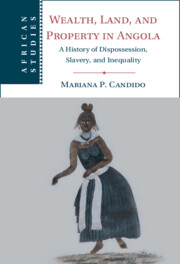Book contents
- Wealth, Land, and Property in Angola
- African Studies Series
- Wealth, Land, and Property in Angola
- Copyright page
- Contents
- Maps and Plans
- Illustrations
- Tables and Graphs
- Acknowledgments
- A Note on Currency and Price-Level Adjustments
- Introduction
- 1 Who Owned What?
- 2 Property Rights in the Nineteenth Century
- 3 Written Records and Gendered Strategies to Secure Property
- 4 Commodification of Human Beings
- 5 Branded in Freedom
- 6 The Erasure of Communal Rights
- 7 Global Consumers: West Central Africans and the Accumulation of Things
- Conclusion
- Bibliography
- Index
- African Studies Series
1 - Who Owned What?
Early Debate over Land Rights and Dispossession
Published online by Cambridge University Press: 22 September 2022
- Wealth, Land, and Property in Angola
- African Studies Series
- Wealth, Land, and Property in Angola
- Copyright page
- Contents
- Maps and Plans
- Illustrations
- Tables and Graphs
- Acknowledgments
- A Note on Currency and Price-Level Adjustments
- Introduction
- 1 Who Owned What?
- 2 Property Rights in the Nineteenth Century
- 3 Written Records and Gendered Strategies to Secure Property
- 4 Commodification of Human Beings
- 5 Branded in Freedom
- 6 The Erasure of Communal Rights
- 7 Global Consumers: West Central Africans and the Accumulation of Things
- Conclusion
- Bibliography
- Index
- African Studies Series
Summary
The uses and transformations of the concept of land use, occupation, and possession in West Central Africa from the late sixteenth to the early nineteenth century are examined. Rather than stressing the concept of wealth in people, this chapter explores how people exercised land rights and control and displayed wealth. In West Central Africa, as elsewhere in the continent, claims over land, people, and things were based on and shaped by notions of kinship, community membership, and the broader social context. The distinction between the public and the private was blurred. Recognition of claims and rights was the result of political and economic competition among rulers, subjects, and neighbors. All actors, some with more power than others, engaged in the definition of land use, rights, occupation, and inheritance, retaining control of goods and wealth that could be expressed in a variety of ways. With the arrival of Europeans in the late fifteenth and early sixteenth centuries, more actors engaged in the principle of territorial occupation and subjugation to make bold claims of sovereignty based on the idea that land was unused or unoccupied. Since different ideas of possession and jurisdiction were at the center of these interactions, clashes between conceptions of land use, access, and occupation are analyzed.
- Type
- Chapter
- Information
- Wealth, Land, and Property in AngolaA History of Dispossession, Slavery, and Inequality, pp. 35 - 63Publisher: Cambridge University PressPrint publication year: 2022



